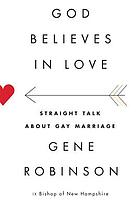Drawing on examples from his own life and the lives of other individuals in committed same-sex partnerships, Robinson pushes his presumed straight, religious (predominantly Christian?) audience to think about how support for same-sex couples is, in fact, a theologically sound proposition. I am, as always, humbled by Robinson's apparently boundless capacity to understand the worldview of those who oppose same-sex marriage in a compassionate way while also speaking in the strongest possible terms for equal rights. In one of my favorite passages he writes:
When you're trying to understand the plight of someone else, when you're trying to understand someone's experience that has never been your experience, you begin by truly listening to him and his stories, really listening. And then -- and this is key, I believe -- you believe his truth. It may not be your truth, and it may not have been anything you have experienced. But you believe that this is the truth of the other person's experience. And you show infinite respect for him by believing him (p. 45).The format -- each chapter title is a "frequently asked question" with the chapter standing as Robinson's answer -- would make this a particularly easy read for a Sunday School class or book group (I imagine this was part of Robinson's intent).
While his emphasis on the conservatism of marriage equality for same-sex couples is no doubt going to frustrate those of us who worry about championing "straight acting" couples at the expense of more unorthodox (yet still consensual, loving, and mutually-supportive) relationship structures, I do hope that this accessible volume will jump-start some fruitful conversations. Conversations that, in the end, will lead to my marriage being legally recognized (and, eventually, culturally celebrated) in not just the state of Massachusetts but in the United States as a whole.


No comments:
Post a Comment